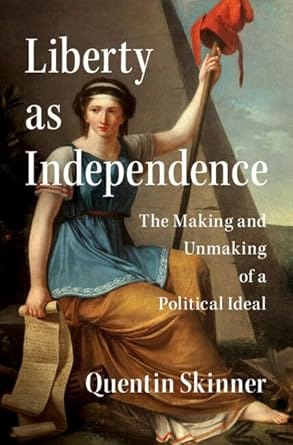What ails millennials?
Or what they say ails them. And lots of other things including some takedowns of Curtis Yarvin.
Adelaide conference on citizen assemblies
Citizen Assemblies for SA (CAfSA) has organised a national conference in Adelaide on June 14, ‘Citizen Assemblies – Policy without Politics’.
Perhaps I’ll see you there. For details and bookings click here.
What ails millennials?
I came upon this explanation for millennials’ lack of a work ethic. I don’t want this to seem censorious of millennials. In fact I have no such complaint about millennials - but if my comments seem a little censorious of the (presumably millennial) author, I guess I’ll have to wear it. Nor do I intend it as a commentary ‘from a baby boomer’ though I am one and likewise, if you take it as such, I’ll have to wear that too.
The piece goes to great lengths to be balanced. No, she’s not saying that millennials have it worse than earlier generations. She’s just trying to lay out the way millennials feel and why - so others understand.
Then she announces, she will “argue throughout this essay, we’re not looking for handouts; we’re looking for hope”. It’s repeated as a kind of mantra at the end of every section. She clearly thinks it is a pretty cool line. I don’t. Firstly, it’s not an argument. Nor is it the conclusion of an argument.
It’s the assertion of a feeling offered as a kind of accusation. And as such it’s a recipe for sterility and unhappiness. If Sarah hasn’t figured out by now that pointing the finger at others doesn’t get her what she wants, it looks like she’s got more unhappiness ahead. Still, I reckon she’ll be OK.
As she explains by way of introduction:
It’s pretty hard to motivate a generation to work when we inhabit a world that was not designed with our best interest at heart.
I remember coming into the world (well not literally, but you get what I mean), and I can tell you, it wasn’t designed with my best interests at heart. In fact it wasn’t designed at all. As I gradually came to understand, it was the product of the struggles of those who’d come before me.
Then we get this:
This may sound extreme, but I am starting to believe that the digital revolution is not only responsible for ripping apart relationships, but also for undermining the democratic process and even changing what it means to be a person.
This is a terrifying concept to live with.
We’re not looking for handouts; we’re looking for hope.
Fair call, but we’re all living with it - at least until we die. Some of us are, in our modest ways, trying to do something about it. Me? I have this idea that there are fairly simple things we can do to improve our democracy - perhaps a lot. And I’m not looking for handouts either. Nor am I looking for hope. I’m just plugging away. I find faith more useful, more active, than hope. Faith that it’s worth doing. This isn’t heroic faith. To be more specific, it is not a belief that I’ll be successful (that’s closer to hope!). It’s rather a faith that, even if I do not achieve any change in the world, it will have been worth doing. I’ve made bugger all progress in that regard so far, but it’s already been worth it.
Then there’s this - perhaps the most intriguing passage in the piece:
Almost all pornographic content consumed by Millennials and Gen Z are what Boomers would consider radical and violent. Anecdotally, most porn-addicted people I have spoken to say that they first became hooked around the ages of 10, 11 and 12.
Now, dear Boomer, I know that you are certain that your children and grandchildren are the exception to the rule. This will be true for some. But even if your son fits into the 25% who doesn’t consume porn regularly, know that at least 75% of his friends do. This socialisation will still impact the way that he views women and relationships.
Likewise, even if your daughter fits into the camp that doesn’t habitually consume porn (the exact number is debated), she will certainly have friends who do, and most of her romantic partners will too, especially if she is straight.
This silent epidemic is now so pervasive it is part of the air we breathe.
I have had heartbreaking conversations with friends who are in long term relationships with porn addicts and recovering addicts. Many say that they can tell when their partner has had a relapse because their eyes glaze over and are unable to see them anymore.
Porn affects Millennial and Gen Z everyday lives in ways that few Boomers can comprehend.
In case you’re not convinced that porn is a terrible thing, know that males who frequently consume porn are more likely to express intent to rape, more likely to support violence against women, more likely to coerce or force a partner into non-consentual sex acts, and more likely to pursue violent sex.
These statistics do not reflect all men, nor do they represent all porn users. However, while there are many male porn users who would never rape anybody, they are still less likely to intervene when witnessing sexual violence, and more likely to blame the victim when hearing about sexual crimes. This is due to the desensitisation which happens over time with frequent use.
Perhaps unsurprisingly, many heterosexual women are opting out of romantic relationships altogether. Why take the risk when most men have little-to-no respect for your ‘no’?
The sad truth is, a growing number of Millennials and Gen Z do not know how to love. We have been formed by a culture that tells us that sex is not special, that bodies are meaningless, and other people are simply objects for our personal consumption.
But what has this got to do with the workplace?
Everything.
If we assume the 75% male and 30% female estimate, roughly 55% of the workforce under the age of 40 has rewired their brain to resemble that of a cocaine addict. This will directly affect their levels of concentration, personal motivation, and ability to delay gratification.
Many feel numbed by the whole thing, and don’t know where to turn for help.
We’re not looking for handouts; we’re looking for hope.
Pretty much everything she documents here really is a bummer. It’s certainly a problem that the internet is so hard to censor. And personally, I’ve always thought that running our culture for profit was a bad idea. But who listens to me? It’s not that unusual not to know where to turn for help. Or to turn to people for help only to find they’d rather get back to their in-tray. Some people take it as a sign to try to cook up some answers themselves, or for others, and they get talking to others and start acting. But it’s a tricky problem and I don’t think hope can be handed out.
Just to check I wasn’t missing anything I asked Claude to check whether there were any statements in the piece about what the author, or her friends were doing, or could do.
The author doesn't offer concrete actions, programs, policies, or personal initiatives that she or others are undertaking or could undertake to address the six major problems she identifies.
This argument from one’s generation is a kind of identity politics. And reflecting on it, identity politics is often most focused on shaming others for purported injustices without offering much light on how they - specific individuals - have perpetrated these injustices or what might be done about them - by the perpetrators or the victims of the putative injustice.
Here’s a passage of some relevance from Rebecca Solnit which Claude found. It’s rather highly wrought but it gets the message across.
Hope is not a lottery ticket you can sit on the sofa and clutch, feeling lucky ... Hope is an axe you break down doors with in an emergency. Hope should shove you out the door, because it will take everything you have to steer the future away from endless war, from the annihilation of the earth's treasures and the grinding down of the poor and marginal. To hope is to give yourself to the future – and that commitment to the future is what makes the present inhabitable.
John Ruskin
Interesting counterweight from Rob Henderson
For better or worse, the educated class largely molds the culture. I witnessed this firsthand shortly after I was honorably discharged from the U.S. Air Force and went to study as an undergraduate at Yale. I was at a breakfast with some fellow students. Our guest was a former governor and presidential candidate... His answers were often variations of the same response: "We screwed up, and it's up to you guys to fix it. I'm so happy to see how bright you all are and how sharp your questions have been because you will fix the mistakes my generation made." This mystified me. This guy was in his sixties, with a lifetime of unique experience in leadership roles, and he was telling a bunch of 20-year-olds that older adults were relying on them?
In the military, we thought of those senior to us as the leaders... I remember in the first week of basic training, our instructor declared, "I don't want any of you [expletive] thinking you are doing anyone a favor being here. I could get rid of all you clowns and have your replacements here within the hour."
Then I got to college and learned that students seldom get expelled for showing disrespect to professors, or anyone else...
Older people are now reluctant to say that they have accrued some knowledge and have some wisdom to impart. Yet young people have a massive hunger for this wisdom. Part of the reason they behave so erratically, I think, is to test where the line is, and to see what knowledge older people can share to steady their anxieties.
Older adults are also reluctant to exert such authority. They might want the prestige that comes with having power, but they don't want the responsibility of exerting it when challenged by a bunch of naive and pampered kids who have experienced zero percent of real life and its attendant hardships.
Why should older generations reclaim their authority and leadership? Because everything we know about the brain and behavior shows that they are more responsible, reflective, and stable than the young. … [Y]oung people act out to see what they can get away with. They want to test boundaries, which older adults are often unwilling to enforce. Many young adults sense this, which often emboldens them. That is, while some young people are implicitly seeking guidance when they act out, others act out because they experience glee when they taunt older adults.
This is, in part, because people generally score the highest on Dark Triad personality traits when they are in their late teens and early twenties. In the realm of personality psychology, the Dark Triad encompasses three interrelated characteristics: psychopathy, characterized by callousness and a profound disregard for others; narcissism, marked by an inflated sense of self-importance and entitlement; and Machiavellianism, which involves strategic exploitation and duplicity for personal gain...
By contrast, studies have found that older age coincides with the Light Triad personality traits, which encompass three factors: faith in humanity, reflecting the belief that others are generally good and worthy of trust; Kantianism, denoting the propensity to behave with integrity and honesty; and humanism, which involves a genuine appreciation for the successes of others.
Examples of these differences abound. A study published in the Journal of Business Ethics revealed that younger professionals were significantly more inclined than their older counterparts to endorse ethically questionable behaviors...
Even after controlling for socioeconomic status, younger adults are more likely than older adults to shoplift, commit assault, and drive while drunk, among other crimes. Developmental criminologists have documented an "age-crime curve," showing a peak in criminal behavior during adolescence and early adulthood that then declines with age...
Beyond overt legal transgressions, younger adults are more deceptive in their everyday lives than older adults. A 2015 study of more than 1,000 individuals aged six to 77 found that young adults aged 18–29 were the most likely to engage in deception and also displayed the greatest proficiency at formulating believable lies...
Older adults consistently rate moral violations more harshly than younger adults, as my own research, completed as part of my doctoral thesis, shows...
Research in behavioral economics underscores age-related differences in cooperative behavior, too. Older adults tend to behave in a less self-interested and more altruistic manner than younger adults. A 2012 study analyzed 287 interactions on the popular British game show Golden Balls... Only 42 percent of contestants younger than age 30 chose to cooperate, compared with 65 percent of contestants older than 50...
Older adults nevertheless crave validation from the youth, which is one reason they are mocked. Young people sense their desire to be seen as cool and deprive them of this by taunting them...
Near the end of their conversation, Bill Maher responded to Drew Pinsky by stating: "Other cultures figured out that older people are generally wiser. The more days you live, the more things you know. When you're young you have beauty, and when you're old you have wisdom."
If older adults keep chasing validation from the young instead of reclaiming authority in their role as elders, they'll keep getting mocked—and deservedly so. Wisdom isn't about being stuck in the past; it's about offering something steady and timeless in a world that feels increasingly unmoored.
Devastating takedown of Douglas Murray
I don’t generally like writing as agro as this. I guess I think it is a bit too agro. At over 5,000 words, it could also have done with a good edit. But it’s well written and argued. And if someone has to get the treatment, I can think of worse targets.
Georges Ruggiu is a former special needs teacher from a small town in the south of Belgium. He grew up as the youngest of four: three sisters; sneering, cruel. When he became a man, he was a very quiet, careful man. Conscientious, rule-following. Five feet tall, skinny, with weird staring eyes. Permanently single. He didn't move out of his parents' home until he was 35 years old, when he went to the big city to reinvent himself. The big city in question was Liège, about twenty kilometres away. For a while he lived alone in a tower block there, not really talking to anyone. But one day his neighbour's water pipe burst, and Ruggiu helped him fix it. The neighbour was called Jean Bizimana, and he was also an outsider in Liège, a Rwandan civil servant interning abroad. Ruggiu ended up falling in with Bizimana's friend group of Rwandan expats. Some of them had political connections back home; they kept inviting him to visit. The first time Ruggiu went to Kigali, fifty people were there at the airport to welcome him to the country. When he moved there permanently, the Rwandan government gave him a house and a job, presenting a French-language show on Radio Télévision Libre des Mille Collines, also known as Radio Genocide...
Ruggiu's motives are cheap and obvious. He wanted to be respected, he wanted people to like him. The first people who ever gave him the time of day turned out to be a bunch of Hutu Power maniacs, and Ruggiu ended up being the only European convicted by the International Criminal Tribunal for Rwanda, but for a while he must have thought he'd got what he wanted. But I think he was wrong. I don't think his new friends in the Rwandan government ever actually respected him. He was their pet. I'm sure they were very amused at the way he managed to express their genocidal resentments in the language of liberalism and justice. I'm sure they found it cute, the way this outsider pretended to be so utterly convinced by the righteoussness of the Hutu cause. They sent crowds to welcome him; they gave him a house. But no one respects a suck-up. Nobody respects a toady...
Anyway, in other news, the British political commentator Douglas Murray recently appeared on the Joe Rogan Experience to promote his new book, On Democracies and Death Cults: Israel and the Future of Civilisation...
Along the way, in dribs and drabs, we learn that every single Israeli is the most beautiful and kind person to live, with great hair and a beautiful shiny set of teeth. Their electronic music is sophisticated, their accents aren't in the least bit grating, and their behaviour on the road is orderly and serene...
What does a death cult look like, according to Douglas Murray? It looks like the Hamas militant who, on October 7th, phoned his family to say what he'd been getting up to. The footage was later leaked: we see the gunman grinning proudly as he reports that 'we are looking for babies, but there is no babies left… I killed a girl, she was 12, but I'm looking for a baby.' The voice on the other end laughs. It looks like the dozens of Israeli children under the age of twelve who were killed with a single expertly placed sniper round to the skull. Or the Hamas infiltrators who seemed to find a perverse sexual pleasure in going into Jewish homes, killing the occupants, and then rifling through underwear drawers. There are endless photos and videos showing Hamas gunmen posing in dresses, wedding gowns, lingerie they'd looted from the dead. The death cult is deeply rooted in Palestinian society; it goes far deeper than Hamas. When it emerged that Israeli hostages in Gaza were being subjected to extreme torture, including being gang-raped, raped with metal bars and cattle prods, raped by dogs, Hamas put some of the militants involved under arrest. Almost immediately, there were massive street protests by ordinary Gazans. They weren't marching for peace, an end to the torture, or the release of the hostages: they were demanding that the rapists be set free. Some Hamas officials broke ranks to officially endorse gang-rape as part of their struggle. 'If he is a Zionist,' said Idris Khalidi, a member of the Shura Council, 'everything is legitimate to do! Everything!' And the same culture of death has sucked in people who live nowhere near the conflict. In Miami, an Arab-American opened fire on a passing vehicle because he thought the two men inside were Jewish. They weren't; in fact, they were themselves Palestinian. One of them made a Facebook post from hospital. 'They tried to murder us in the heart of Miami,' he wrote, 'but Allah is with us. Long live Palestine, death to the Jews.'
I could keep up this shtick for a very long time, but let's pull back the curtain: none of the things I just described were done by Hamas; all of them were done by Israel and its supporters. The rape-torture camp is in the Negev, near Be'er Sheva, and it was endorsed by members of the Israeli cabinet. The man in the hospital didn't say 'death to the Jews' but 'death to the Arabs.' Those children were picked off by Israeli snipers...
I do actually agree with Douglas Murray that there is such a thing as evil in the world. Where we disagree is that I think there is a germ of evil buried inside all of us, and most of the time that germ is something perfectly mundane. Georges Ruggiu just wanted to be respected: that desire is not evil in itself, but it can make you do evil things. (There's evil in me as well. I'm no stranger to the pleasure of hating; I'm doing it right now.)...
I don't know why Douglas Murray is like this. Maybe it was tough being gay at Eton, maybe the other boys made him feel like less of a man, maybe that's why he's always hanging out just around the corner from the front lines, with his flak jacket and his serious face on. It's usually something similarly tedious, but I'm not his analyst. All I can say with certainty is that whatever it is, it's failed. Listen, Douglas—can I call you Doug?—listen, Doug, these Israeli friends of yours, these fat-fingered pig-eyed Israeli thugs you worship so much: they do not respect you. They'll invite you for dinner and they'll give you awards, they'll let you pose for photos in the ruins they made, but they are laughing at you. You can play dress-up all you like; your body armour doesn't fool them. They're happy to let you debase your own name by attaching it to whatever lies they feel like spinning today, but they know very well that you are debasing yourself. No one respects a suck-up, Doug. No one respects a toady.
Three wise men
Stunning stuff. Details here.
Curtis Yarvin: First assume a can opener
On quite a few occasions I’ve drawn attention to Curtis Yarvin’s work here. My own take is that his analyses are often provocative and powerful. His solutions are silly. I was reading him for provocation and to be given a ‘take’ on the world from a place very different to my own and was genuinely rewarded by the effort. But because I didn’t take his solutions seriously I wasn’t going to read his back catalogue.
But Scott Alexander has. And what he shows is that the conditions Yarvin originally put on his embrace of monarchism did actually come with some caveats designed to answer the obvious question - “How do we stop a monarchy becoming a tyranny?” Turns out Curtis was hard at work specifying all manner of safeguards. Because it’s impossible to see how they get implemented, Yarvin joins what I call the “assume a can opener” school of political philosophy.
But in documenting that - Scott Alexander shows how, as a can opener stubbornly refused to turn up, Yarvin dropped the requirement for a can opener altogether. Like he said, we’ve just got to get more used to dictatorship.
The Blogger Who Hates America: A Response
Cathy Young's new hit piece on Curtis Yarvin (aka Mencius Moldbug) doesn't mince words. Titled The Blogger Who Hates America, it describes him as an "inept", "not exactly coherent" "trollish, ill-informed pseudo-intellectual" notable for his "woefully superficial knowledge and utter ignorance".
Yarvin's fans counter that if you look deeper, he has good responses to Young's objections:
Both sides are right. The synthesis is that Moldbug sold out.
In the late 2000s, Moldbug wrote some genuinely interesting speculations on novel sci-fi variants of autocracy. Admitting that the dictatorships of the 20th century were horrifying, he proposed creative ways to patch their vulnerabilities by combining 18th century monarchy with 22nd century cyberpunk to create something better than either. These ideas might not have been realistic. But they were cool, edgy, and had a certain intellectual appeal.
Then in the late 2010s, as soon as his ideas started getting close to power he dropped it all like a hot potato. The MAGA movement was exactly what 2000s Moldbug feared most - a cancerous outgrowth of democracy riding the same wave of populist anger as the 20th century dictatorships he loathed. But in the hope of winning a temporary political victory, he let them wear him as a skinsuit...
Classic Moldbug Believed Populist Dictatorship Would End In Disaster
Classic Moldbug admitted that fascism and communism were extremely bad. He just drew different borders around political systems: fascism, communism, third world banana republic dictatorship, and democracy all cluster together as systems where coalitions rule because they can seize temporary power in a semi-lawless society. From here, my bolding.
Clearly, the worst forms of demotism, the really bad apes, were the totalitarian systems—fascism and communism. The main difference between fascism and communism was not in mechanism, but in origin—fascist elites tended to be militarist, communist elites intellectual. But the one-party state is a clear case of convergent evolution.
To a neocameralist, totalitarianism is democracy in its full-blown, most malignant form. Democracy doesn't always deteriorate into totalitarianism, and lighting up at the gas pump doesn't always engulf you in a ball of fire. Many people with cancer live a long time or die of something else instead. This doesn't mean you should smoke half of Virginia before lunch.
I'm trying to avoid subjecting you to too many Moldbug walls of text, but this is a constant hobbyhorse of his. Unless you implement his neocameralist ideology of shareholder control, your attempted autocracy will become a totalitarian state, which will be even worse than regular democracy...
The Dictator Must Not Be Elected
The original sin of democratic/totalitarian governments is permitting power struggles. When you permit power struggles, the most power-hungry person wins. This person is probably a bad guy. But even if he isn't, he has to optimize for gaining and maintaining power, instead of for the national interest...
How do you come to power without a fight? This is a tough ask, but Classic Moldbug bit the bullet: anybody who wants power is unworthy of it. You have to just sit there being worthy. When people get tired of sucking, they'll give you power...
If you break this rule and seek electoral power, you are punished with something terrible: right-wing populism, which is basically the same as Hitler and must be prevented at all costs...
At Long Last, I've Created The Populist Strongman From My Classic Series Of 11,000 Blog Posts "Don't Create The Populist Strongman"
I enjoyed reading Unqualified Reservations, way back in 2013. I didn't agree with it, but I thought some parts of it were good, and even the bad parts helped me think clearly about the nature of power. I hoped the neoreactionaries would take the good parts, ditch the rest, and build something useful out of it. I think some people, mostly outside the organized neoreactionary movement, did exactly that. Unfortunately, Yarvin went the opposite direction, jettisoning the good stuff in favor of the bad. All the warnings against populism, party politics, corrupt power-seeking officials, misinformation, and mobocracy have been filed away in favor of a Flanderized "maybe dictatorship is good".
Just the few posts I've highlighted in this essay have listed over a dozen tests - by tests I mean something where Moldbug says something is an absolutely vital feature of the new regime, or that without it things would descend into kleptocracy, or that this is the only safeguard against Hitler, or something along those lines. These include:
The reactionary party always tells the truth
The reactionary party is an exclusive-members only club
The reactionary party's supporters don't have normal political emotions or feel anger at the other side
The reactionary party starts by appealing to the smartest people, and is wary of including commoners
The reactionary party refuses to hold a normal democratic office like President
The reactionary party has a shadow government in place before getting elected
The reactionary party resigns within a year in favor of an apolitical administrator
The reactionary party openly campaigns on a platform of abolishing the Constitution, and goes through with it immediately upon election.
The regime did not originate as a democratic political party (except a reactionary party meeting the criteria above)
The regime doesn't use activism, journalism, or any other attempt to shape public opinion
The regime is perfectly secure, backed by cryptographically-locked weapons
The regime is a joint-stock corporation controlled by shareholders
State revenue is distributed to shareholders as dividends
There is a board of directors representing shareholders which can fire the executive if needed
There is a stable royalty dynasty with a clear succession
Reactionary blogs don't attract negative attention
We're told not to let the perfect be the enemy of the good. But Moldbug seems pretty fixed on perfection, constantly warning that you have to follow these rules or else you'll get Hitler and it will be even worse than normal democracy. By my count, the Trump administration is zero out of sixteen.
A profile of Yarvin
Diffuse and descriptive in the way of newspaper profiles, but interesting to see he’s not prepared to gaslight us on DOGE.
Before gutting the federal workforce became Elon Musk's job, it was Curtis Yarvin's dream.
Yarvin — a Silicon Valley blogger and software developer who argues for replacing American democracy with a dictatorship — spent years outlining an assault on what he calls "the cathedral" of elite power and consensus. Long before the U.S. DOGE Service launched in January, Yarvin coined his own four-letter acronym for bureaucracy-slashing: RAGE, or "Retire All Government Employees."
Although he says he has never met Musk, Yarvin is a powerful influence among those carrying out DOGE's radical cost-cutting agenda, two advisers to the effort said. One, who spoke on the condition of anonymity because he was not authorized to describe the group's work, said Yarvin had offered "the most crisp articulation" of what DOGE, which stands for Department of Government Efficiency, is trying to achieve.
"There's this alliance of the media, of universities, of government," the DOGE adviser said. "These people are capturing the government and using it for their own ends and for their own power. And that's very scary to us. You want to lessen the power of the cathedral."...
But Yarvin, 51, isn't celebrating. In fact, in several recent interviews with The Washington Post, he offered a surprisingly harsh assessment of DOGE, comparing it to an orchestra of chimpanzees trying to perform Wagner.
"In the worst aspects of DOGE, there's this aspect of the incel who gets mad at the girl who won't sleep with him," Yarvin said, using the term for so-called involuntary celibates. "That's not a powerful attitude."...
Despite his informal role as secular prophet to DOGE and some Trump administration policymakers, Yarvin now asserts that Musk and President Donald Trump are needlessly harming and antagonizing government experts whose support they should be seeking.
"It's very shortsighted behavior from the standpoint of building capital, or building power," Yarvin said. "They're really acting on a seat-of-the-pants basis."...
Inside the cathedral
Writing under the pseudonym Mencius Moldbug, Yarvin gradually constructed a radical critique of liberal democracy. Drawing on the scientist Richard Dawkins's concept of "memes" — ideas that compete and replicate themselves through natural selection, just as genes do, without regard to their underlying truth — Yarvin argued that the egalitarian rhetoric of the left masked self-serving ideals whose true function was to expand elites' power.
The network that nurtures these concepts — the news media, universities and similar sources of supposed expertise — make up Yarvin's "cathedral." American leaders had become dangerously reliant on such institutions, he argued, diluting responsibility for the government's diminishing performance...
Two of Thiel's politically ambitious protégés also embraced Yarvin's thinking. Yarvin said he met Vance and Blake Masters before they entered politics, at social gatherings when they were Thiel's employees. Both men cited Yarvin during their campaigns, specifically referring to RAGE, his proposal for dismantling the federal bureaucracy.
"There's this guy, Curtis Yarvin, who's written about some of these things," Vance said on a right-wing podcast in 2021. He went on to offer his advice to a then-hypothetical President Trump in his second term: "Fire every single mid-level bureaucrat, every civil servant in the administrative state, and replace them with our people."...
'Yarvin is the brain'
Musk had embarked on his own mission, sending loyalists to tear through government agencies, hoover up citizens' data, slash programs and force thousands from their jobs. The billionaire has taken such a forceful approach, according to people who know him, because he believes the government is deeply broken.
Musk installed himself in the Eisenhower Executive Office Building adjacent to the White House, his 4-year-old son and his video-gaming computer in tow, exhibiting a vision of executive power that looked to be straight out of Yarvin's playbook.
The resemblance was no accident, according to the two people who have advised DOGE and are familiar with its leaders' thinking.
"It's an open secret that everyone in policymaking roles has read Yarvin," one of them said. "They were able to take the Curtis theory and use it to empower people on the ground to actually do stuff — even if they can't admit it publicly."...
"It's more like, Yarvin is the brain."...
After Allen left, Yarvin took up a position in the corner of the club's warmly lit lounge to joust with a few left-wing critics. His challengers pressed him on DOGE, saying the initiative was clearly inspired by the "neo-reactionary" movement Yarvin founded.
"I don't see him thinking like me," Yarvin said of Musk.
"He's fulfilling the neo-reactionary dream," a young man in the front line of Yarvin's critics said.
"No, he's not," Yarvin said, a trace of exasperation in his voice.
"My answer," Yarvin added, "is, in a way: I wish."
Shani
A great list of observations, introduced by Venkatesh Rao.
This post by shani on people-watching, which might be the best bit of non-fiction I’ve read so far this year.
A lot of people try to write listicles like this, but they’re usually no more than lazy inventories of unexamined personal prejudices, bolstered by a decided lack of actual observational talent. This is different. The insights ring both grounded and surprising, in the sense that they seem genuinely born of a preternatural skill at people-watching, and take seemingly obvious points just a little deeper than normal people can. Objective evidence, if you want it, can be found in Shani’s drawings and sketches, casual outtakes from her professional wedding painting work. Proof-of-Eye if you will.
I think I’m a pretty good people-watcher myself, and in fact much of my consulting work rests on that skill (though mine rests more on reflective analysis than acuity of observation), but this is next level.
Not a happy camper
The Settlers: An Incomplete Portrayal
How do you sniff out high value stuff? “Palestinian writes with desire for Israel’s side of the case to be better understood” is a good start. Then keep your wits about you. And also prepare to be wrong. I don’t know enough to judge this, but I was glad I read it. Feel free to set me straight in comments. The YouTube video seems to have the whole article.
I watched the latest Louis Theroux documentary The Settlers with the same apprehension with which I approach most Western media output relating to the conflict between Palestinians and Israelis. There is nothing quite like the capacity of well-meaning Westerners to grossly misunderstand and miss crucial pieces of the puzzle in regard to the history and context of why Israelis and Palestinians are fighting one another.
While the war between Hamas and Israel has dominated most headlines over the past eighteen months, this particular documentary focuses instead on Israel's military occupation of the West Bank, and particularly on the growth in Israeli civilian settlements since 1967, when the Jewish state captured the West Bank from Jordan in the Six Day War.
Today, there are over 700,000 Jewish Israelis living there, residing in upwards of 279 settlements, which range from what are effectively modern cities like Maale Adumim and Modi'in Illit, with tens or hundreds of thousands of inhabitants, to ad hoc hilltop encampments made up of tents, sheds, and tin-roofed shacks, housing just a few families...
I would appreciate a documentary that gave me a window into a world that I have not been able to see in person and helped me empathise with the people on the other side. Louis Theroux's documentary did not do that. Instead, it left me frustrated and deflated. Theroux's settler interviewees were a selection of nasty extremists who lurched between denying the existence of Palestinians and expressing the desire to conquer more land and drive out the Arab inhabitants...
I agree that many people dehumanise others in order to justify harming them or going to war against them. This tendency has no doubt played a huge role in perpetuating this conflict. The trouble is that this is a game two can play. There are people on both sides who express disdain for the other group's rights. Theroux—like many well-meaning Westerners who have intervened in the discussion of this conflict—doesn't even try to understand the nuances involved, nor does he seem familiar with the complex history behind the occupation. But without understanding this mess, how can we ever hope to fix it?
A major omission in Theroux's documentary is his failure to mention the fact that, between 1948 and 1967, when the West Bank was part of Jordan, all the Jewish inhabitants were expelled and ethnically cleansed from the land...
The bigger and far more practical issues that Theroux skirts around involve the security concerns and broader ideological issues that would have to be factored in before ending the occupation. Let's say Israel decided to shut down the settlement movement altogether and leave the West Bank. Well, there is a template for that. Under the leadership of Ariel Sharon, Israel unilaterally withdrew from Gaza in 2005, using the IDF to forcibly evict Israelis who were living there—and we know how that went. Within a couple of years of the Israeli withdrawal, Gaza was taken over by Hamas, who used the land as a base from which to wage a war of total jihad against Israel...
Nothing would be stupider than to allow a war like the one in Gaza to happen in the West Bank. What happened in Gaza after Sharon's withdrawal should be a cautionary tale. There needs to be an organised and coordinated handover, as well as measures in place to prevent Hamas or a similar jihadist group from taking over either the West Bank or any future Palestinian state. That means that we need a negotiated agreement between the Israeli leadership and a Palestinian leadership that will guarantee mutual security and peaceful coexistence. This is what I have been campaigning for, for many years now, as a means to first de-escalate and eventually end the conflict.
The other manner in which the occupation could be ended would be for Israel to annex the West Bank and Gaza in the same way as they annexed East Jerusalem, which would open up a pathway to Israeli citizenship for Palestinians, and merge Israelis and Palestinians together into a single state. But there is no guarantee that most Palestinians and Israelis would even want this. My understanding is that, generally speaking, Palestinians want to live in a Palestinian state, while Israelis want to live in an Israeli state. Marrying the two would likely risk more violence from extremists unless there were a real reconciliation—which seems an extremely long way away right now...
Most of these considerations are largely absent from Theroux's documentary. We can talk about the destructive behaviour and expansionist ideology of Israeli settlers all day—but without addressing the other problems inherent to the conflict, this is little more than cheap point-scoring. Yes, we should all condemn the behaviour of violent and lawless settlers in the West Bank, and their crimes, which include burning Palestinian olive groves and attacking Palestinian homes and other properties. But where do we go from there, if the leaders are not willing to make peace with each other? That's the core problem here. It will take a lot of maturity and hard work to untie this Gordian knot. Crudely blaming everything on one side will not help at all.
By talking to each other and trying to understand one another, we might be able to build better relationships and forge connections that could transcend the conflict and ultimately end this tragic, horrific, nightmarish fight.
John Cleese was impressed!
Speaking of the rule of law
I can’t count the number of readers who’ve asked when I’m going to reproduce something here about the history of the tomato. Well the time has come.
Dangerous Chimera
I’ve previously drawn attention to the excesses of neoliberalism. They were built in by the obsessive focus on reducing constraints on the market as opposed to other aspects of freedom. Isaiah Berlin made a famous distinction between negative (neoliberal) liberty and ‘positive’ liberty and it carried all before it. But republican liberty has been making a comeback.
Here’s an excellent review of Quentin Skinner’s latest, and given his age, perhaps his last book. He was the pin-up boy for the kind of history I learned at uni. History in the image of R. G. Collingwood’s dictum that you couldn’t understand political thinkers (or any thinkers for that matter) as promulgators of propositions - say that supply creates its own demand. You needed to understand them as posing questions and answers to those questions. In other words, you needed to understand them in context.
In a less frequented corner of YouTube, the late Marxist philosopher G.A. Cohen lives on in a few comic skits. Among the funniest of these party pieces are two diatribes on 'the German idea of freedom'. Cohen adopts the persona of a deranged Teutonic philosopher who claims that 'no greater freedom can be imagined for a man than absolute blind submission to an unjust law.' ... his monologue also points to a more general problem: the ways we confound words and things, deceived by the multiple meanings and hidden implications of seemingly basic political concepts.
Political theorists have long been aware of the dangers lurking in the superficially innocuous term 'liberty'. At the height of the Cold War, Cohen's mentor and friend Isaiah Berlin raised the problem of 'Two Concepts of Liberty' in his inaugural lecture at Oxford. Berlin distinguished between positive liberty – broadly speaking, self-government – and negative liberty: the freedom of the individual from government interference. ...
One prominent early critic, the American philosopher Gerald MacCallum, thought that Berlin had mistakenly reified two aspects of a single category, but a later commentator, the Cambridge historian Quentin Skinner, went in the opposite direction, arguing that Berlin had overlooked a highly distinctive version of liberty, which he labelled 'neo-Roman'. He set out this position in various venues, but most poignantly when he delivered the Isaiah Berlin Lecture at the British Academy in 2001 on 'A Third Concept of Liberty' (a version of this essay appeared in the LRB of 4 April 2002). More precisely, Skinner thought he had identified a second type of negative liberty, of which there were 'two rival and incommensurable theories'. He found in the Roman historians Livy, Sallust and Tacitus and in their early modern reception an emphasis on free citizenship, conceived as the absence of subjection to the will of another. Negative liberty, Skinner argued, can take the form of the liberal conception of non-interference or the Roman idea of non-dependence on the power of someone else.
In recovering this lost Roman concept of freedom, Skinner had, as he warmly acknowledged, an ally in the political theorist Philip Pettit. But there is a subtle distinction between their positions. Whereas Pettit emphasises non-domination as the leitmotif of a tradition of republican freedom, Skinner thinks that the primary feature of this strain of liberty was the absence of dependence, and that adherence to this way of thinking about liberty wasn't confined to those with overtly republican political commitments. For Skinner, neo-Roman liberty was a kind of status rather than merely a freedom of action. ...
[Skinner's] new book shows his formidably detailed knowledge of another outlying zone of his immense hinterland, the political thought of the 18th century – not just the works of canonical figures, but now obscure pamphlets and sermons as well as imaginative literature. ... The book advances a remarkable explanation of how and when our liberal notion of freedom displaced the neo-Roman version, recovering an overlooked history of the formulation of liberty in 18th-century English political culture. ...
By the 1740s, neo-Roman arguments were being used to underpin Britain's claims to be a free state. However, several major novelists – Henry Fielding, Samuel Richardson and Tobias Smollett – interrogated what Skinner calls 'Whig complacencies'. ... But literary exposure of the sham and hypocrisy behind Whiggish boasts about English freedom did little to dislodge the prevailing conception of liberty.
Despite this, its commanding position in English political culture crumbled with extraordinary rapidity between the 1770s and 1790s. Skinner has identified what must constitute a major turning point in modern history, yet one that has gone largely unnoticed. ... The reader casually assumes that the displacement of neo-Roman categories by a liberal understanding of freedom must have had something to do with the emergence of the market as the dominant trope in modern political language. But while Skinner thinks it plausible that the 'new view of liberty' held some attraction for champions of the market, he traces its provenance back before the 18th-century emergence of commercial society. What's more, he identifies specific and immediate factors that caused liberty as non-interference to 'ascend so suddenly to a position of ideological dominance' from the late 1770s.
At the heart of Skinner's story is a defamiliarised version of the American Revolution, which brings into focus its transformative effect on the political idioms of the motherland. In the late 1770s, a conservative clerisy – jurists, clergymen, political pamphleteers – adopted the liberal idea of freedom as a way of 'fending off the republican and democratic potential' that was becoming apparent in the older tradition of liberty. The threat came particularly from an ideological fifth column in Britain that openly supported the American cause. In February 1776, Richard Price, the minister of a dissenting Presbyterian chapel at Newington Green, then a village outside London, published Observations on the Nature of Civil Liberty, which was in its fifth edition by March. Not only did Price align himself with the colonists' claim that they were being taxed without their consent, but he made a more general argument that called into question whether Britain under its unreformed constitution was genuinely a free state. Since self-government was the defining attribute of liberty, even being 'guided by the will of another' implied a form of 'servitude'. Therefore, Price contended, when the laws were 'made by one man, or by a junto of men in a state, and not by common consent, a government by them does not differ from slavery'. ...
In response to Price, pro-imperial pamphleteers used the arguments of a 17th-century strain of Continental – but reliably Protestant – natural jurisprudence which stressed the distinction between the natural liberty enjoyed in the intolerably stressful conditions of a state of nature, where there is no safety or security from the depredations of others, and the very different kind of civil liberty enjoyed as a subject of government. ... Independence was indeed, they agreed, an attribute of humankind in the wretched condition of natural liberty; but civil life implied – and depended on – its renunciation. In the more fortunate and vastly different condition of life under civil government, the ideal of independence had become a dangerous chimera.
Between the late 1770s and the 1790s the arguments of natural jurists were recycled by a host of English propagandists who restated the idea of liberty in terms of a lack of restraint on actions. ... An influential subset of these writers was associated with a utilitarian turn in English political thought – not only Jeremy Bentham, but also his friend John Lind and the clergyman William Paley, whose Principles of Moral and Political Philosophy (1785) had gone through fifteen editions by the time of his death in 1805. ...
While Skinner punctiliously observes historical proprieties and writes with precision, clarity and accessibility about all the writers he discusses, there is a note of plangency in his central arguments, a sense, too, of deep passions coolly suppressed. The stunted liberalism we live with today, Skinner argues, is the consequence of an urgent conservative strategy in the age of revolutions to redescribe the contours of liberty. The older understanding of liberty as independence did not entirely disappear, but was confined to the socialist margins of 19th-century political culture. Recovered, this notion has the potential to inspire a more empathetic way of thinking about today's precariat of zero-hours employees, casualised workers and deunionised staff dependent on the whims of employers. It also offers, Skinner suggests, a connection that might prevent the untethered ideals of liberty and democratic self-government from drifting dangerously further apart. Whereas Berlin saw no necessary connection between liberty and democracy, Skinner argues that representative democracy is the only form of governance that can guarantee liberty as independence: 'No democracy, no liberty.'
The most unsettling of this book's surprises lurks in its unadvertised implications. If Skinner's is a story of loss – the submersion of a concept of liberty which for all its flaws in practice was pregnant with greater democratic potential than the liberalism that replaced it – where does that leave our grand narratives of democratisation? ...
Heaviosity half hour
Quentin Skinner on Liberty
Conclusion: A Reckoning
I have sought to trace the fortunes of the belief that liberty consists in independence, and is forfeited whenever we find ourselves living in subjection to the arbitrary will and power of any other person or group. As I have attempted to show, this view was almost universally accepted in early modern anglophone political theory, but was displaced by the end of the eighteenth century in favour of the rival claim that liberty simply consists in non-interference, in absence of restraint. One large question that remains is whether this conceptual transformation can be regarded as an intellectual advance. Or are there instances of unfreedom that the view of liberty as independence serves to highlight and the view of liberty as absence of restraint tends to overlook or obscure?
Some recent critics have attempted to dismiss these questions by arguing that the ideal of liberty as independence was so deeply associated throughout its history with misogynist, militaristic and hierarchical prejudices that we cannot hope to make any fruitful use of it. The same could of course be said about the view of liberty as absence of restraint. Both theories have undoubtedly been used to serve unjust ends. But it makes little sense for critics of the ideal of liberty as independence to object that it is 'fundamentally inegalitarian' and 'inherently conservative and elitist'. The theory simply affirms the claim – the anti-elitist claim – that individual liberty is best understood as absence of subjection, and thus that liberty is conceptually connected with equality. The normative question that remains to be answered is whether there is anything to be gained from reconsidering this line of thought.
My answer is that, in common with many others who have recently raised this issue, I believe that the ideal of liberty as independence has a great deal to contribute to current debates about the improvement of our moral and political world. One reason for preferring this view is that it helps us to think more sympathetically about our relations with fellow members of civil society. Consider, for example, the extent to which de-unionised workforces increasingly live at the mercy of employers with power to dismiss them at will. Or consider how far the widespread economic dependence of women continues to limit their freedom of choice, leaving them vulnerable to partners whom they lack the resources to escape. The loss of liberty suffered in these circumstances need not stem from any overt acts of coercion or interference; it already stems from the mere fact of living in subjection to the arbitrary and dominating will of others. As these examples suggest, some of the most troubling subversions of civil liberty currently arise from these sources. But the defenders of the view of liberty as absence of restraint are not well placed to recognise them. They are committed to the belief that, although living in subjection may affect the security with which you enjoy your liberty, this does nothing to undermine your liberty itself. This makes it all too easy for them to conclude that 'the worker or wife is at liberty to dissolve a relationship that has become oppressive', without any acknowledgement that such a course of action might be dangerous or impracticable.
The view of liberty as independence also seems to me to yield a morally preferable account of the relationship between government and the governed. There are several different aspects of this relationship that need to be considered. Perhaps the most obvious is that this view sees a close link between the securing of individual liberty and the upholding of democratic forms of government. One outcome of the victory won by the proponents of liberty as absence of interference was the weakening of this link. They believe that the question to ask about liberty under government is not so much who makes the laws as rather how many laws are made, and hence how much freedom from restraint is left to us. As Isaiah Berlin was happy to put it in his classic essay Two concepts of liberty, 'there is no necessary connection between individual liberty and democratic rule'. The reason is that, because liberty consists in 'not being interfered with by others', it is 'principally concerned with the area of control, not with its source'. This being so, Berlin concludes, we might find ourselves suffering less interference, and thereby enjoying greater liberty, under some forms of autocracy than under a system of self-government.
By contrast, the view of liberty as independence includes the claim that we can never hope to enjoy our freedom except under a constitution in which two conditions are satisfied. One is that we must be fully secured in the enjoyment of our essential rights. The other is that, by a fair process of representation, each of us must be able to make our voice heard equally with that of every other citizen in establishing and upholding the laws under which we live. Unless these conditions are fulfilled we shall remain subject to the mere will of our rulers and lose our standing as free citizens. A democratic form of representative government is the only form in which liberty as independence can be guaranteed. No democracy, no liberty.
This ideal of liberty also embodies what seems to me a more satisfactory way of thinking about the rights of citizens within and potentially against the state. This point seems especially worth underlining, if only because it is often objected that the ideal of liberty I have defended is insufficiently attentive to the significance of individual rights. I have tried to establish that this criticism is unfounded, and in Chapter 2 I also showed how the defenders of this ideal engaged in a debate about how the concept of individual rights should be understood. I now want to suggest that, if we reflect on this debate, we may be able to learn something to our present advantage about government and the governed.
Among exponents of the ideal of liberty as independence in its heyday, a majority affirmed that the rights enjoyed by free persons take the form of universal moral claims that everyone can equally make on others, who in turn have a duty to recognise the demands being made on them. These are the rights we are said to enjoy simply in virtue of being human. They are taken to be logically prior to any system of law and to stand wholly outside the political realm. They are, in a word, natural rights, and by the end of the eighteenth century they had also begun to be described as human rights, 'the common rights of humanity'. If we ask who has conferred these rights upon us, we find that the dominant answer – from John Locke in the 1690s to Mary Wollstonecraft a century later – was that they are granted to us by God as the author of nature and that, as expressions of his will, they embody a universal standard of rightness. As we have seen, Locke frequently has recourse to this argument in the Second treatise, and Wollstonecraft continues to speak of natural rights both as our birthright and as a God-given inheritance.
The assumption that rights are universal moral claims still underpins most contemporary discussions of human rights. As a number of philosophers have lately argued, however, this is not an illuminating way of thinking about the provenance and character of the rights that most concern us. One problem is that the identification of human rights is still frequently made to depend on something akin to unsupported religious premisses. For example, the Universal Declaration of Human Rights of 1948 begins by affirming that all human beings are endowed with reason and are born free and equal in rights, after which twenty-nine human rights in the form of universal claims are presented as self-evident truths. A further problem with the approach, which the Universal Declaration might also be said to illustrate, is that it becomes difficult to prevent such unargued lists of rights from inflating into an inventory of everything judged to be necessary for a good life.
I concede, in short, that this way of thinking about rights runs into several difficulties. The same is by no means true, however, of the alternative view of rights that we also encounter in the heyday of discussions about liberty as independence. As we saw in Chapters 1 and 2, many defenders of this view of liberty were careful to avoid any reference to natural rights, preferring instead to speak exclusively about what they characterised as fundamental rights. The rights on which they concentrate are taken to consist of legally grounded liberties that have grown up over time, thereby helping to shape the views of a particular society about what constitutional arrangements are most conducive to securing the liberty of subjects against any encroachments of arbitrary power. These rights are held to be fundamental in the sense of being essential to the preservation of our standing as free persons, and are described as liberties to indicate that we have no duty to abstain from exercising them. But they are never declared to be universal or fixed. They are merely said to reflect the considered views of a long-established legal and parliamentary system about what arrangements are most conducive to securing freedom from dependence.
As we saw in Chapter 2, this was the view of individual rights most fully articulated by a number of historically minded legal and political writers in the wake of the 1688 revolution. They rejected the idea of a contract between rulers and subjects to uphold some supposedly antecedent natural rights. The rights and liberties enjoyed by the people as free subjects are said to have been constructed within and by the state itself. They became established at an early stage in the history of the nation, and have subsequently proved their value and efficacy over the course of time. They remain the most basic of the rights that need to be secured if we are to live in liberty, and are thus the rights that every government has a duty to uphold against any encroachments of arbitrary or despotic power. As I have been intimating, this line of argument seems to me potentially more helpful than current appeals to the metaphysics of natural or human rights.
As well as helping us to think more effectively about the relations between states and citizens, there is a case for saying that the ideal of liberty as independence is no less useful when it comes to thinking about the relations between states themselves. There are many states that currently live to some extent in dependence on the arbitrarily wielded power of richer states. A state or corporation that chooses to invest in an economically disadvantaged country will always be in a position to exact special privileges. These may include favourable tax rates, easy regulatory conditions and a lowering of environmental standards. A sufficiently powerful state or corporation may never need to signal its desire for such favours; there can scarcely fail to be a mutual awareness that a sufficiently disadvantaged state will not be in a position to refuse. According to the view of liberty as non-interference, the freedom of action of the disadvantaged state will not be infringed unless coercion is employed. But this merely reveals the incapacity of this view to recognise how discretionary and hence purely dispositional power can undermine autonomous choice. It is the mere awareness that the investing state or corporation has the power to impose its will that has the effect of taking away the liberty of the disadvantaged state. I conclude that, in the case of states no less than individuals, it is difficult to see how the requirements of justice can be met in the absence of a commitment to the ideal of liberty as independence.





























Hi Nicholas, I am thoroughly enjoying your newsletter. Thanks you. I am wondering if you would be able to touch on your thoughts on the unrealised capital gains tax on superannuation accounts in a future newsletter please? Interested in your measured view :)